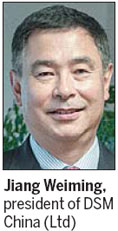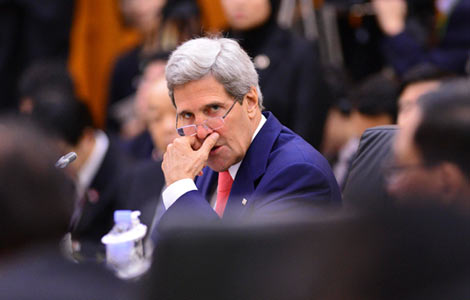DSM China heralds 'cosmopolitan' outlook
Updated: 2013-10-11 07:46
By Shi Jing in Shanghai (China Daily)
|
||||||||
The establishment of the China (Shanghai) Pilot Free Trade Zone is exciting news, even for a 100-year-old company like Netherlands-based Royal DSM.
"The launching of the FTZ in Shanghai means that the country is giving this cosmopolitan city a different orientation. We are quite excited about the news and are looking forward to the future benefits it will bring," said Jiang Weiming, president of DSM China (Ltd).
He said the company has high expectations of what the FTZ will herald in terms of facilitating smoother trade to bolster imports and exports, such as by easing taxes and providing more internationally friendly services.
But in the long run, the changes it involves are likely to be more sweeping, he added.
Established in 1902 as a coal-mining company, DSM has gone through several incarnations and is now focused on researching and developing food and dietary supplements, coatings and paints, alternative energies and bio-based materials.
Amid Europe's ongoing debt crisis, DSM has shifted its attention to China to capitalize on its huge domestic market while using the country as a test bed for new technologies and products.
Lured by generous incentives and favorable conditions, DSM was one of the largest foreign high-tech companies in 2009 to establish a headquarters in China, as well as a science and technology center at the Zhangjiang High-tech Industrial Development Zone in Shanghai.

Since then, it has expanded its presence on a 26,000-square-meter site in the area, while moving to concentrate on life science and material science products, as well as R&D.
The company plans to invest $1 billion in a production center in Zhangjiang, in addition to research facilities. This is the biggest investment it has made outside of its home borders.
"The recent slowdown in China's economic growth makes economic restructuring a must, but it also provides opportunities for emerging industries, such as those that deal in new materials.
"It's good to see that the major five industries in Zhangjiang coincide partly with our major strengths. It reminds me of the phrase, 'Great minds think alike,'" said Jiang.
DSM China's sales revenue reached $1.7 billion in 2012, accounting for about 14 percent of the group's total annual revenue. Meanwhile, its business divisions saw average growth of 5 to 6 percent that year. This prompted it to raise its China sales target to $3 billion for 2015. With 200 locations on five continents, DSM has 23,500 staff, some 3,500 of whom are based in China.
Shanghai is hoping that the FTZ, and the innovations it implicitly promises, will lure more leading companies like DSM to settle in the city.
"It is sure to become one of the main battlefields for Shanghai's economic restructuring, IT innovation and the development of strategic emerging industries," said Ma Jing, chief engineer of the Shanghai Municipal Commission of Economy and Informatization.
Jiang claims DSM serves as a prime example of how restructuring can pay dividends. The company has shifted focus over the years from coal to commodity chemicals. It now deals mostly in pharmaceuticals, food and new materials.
In China, it started off trading a chemical compound called urea, then switched to producing alternative forms of energy, animal feed and new materials, among other businesses. The R&D center in Zhangjiang focuses on new materials and food materials. Its task is to serve the Chinese market and ensure that all of the company's R&D centers share their findings.
"Zhangjiang releases a development report each year. But apart from the criteria laid down by the Ministry of Science and Technology, it also has its own goals to meet. By 2020, Zhangjiang will satisfy all of the national-level criteria, as well as its own goals, to grow into a world-class industrial park," said Hou Jin, deputy director of the zone's management committee.
Jiang said that new incentives are needed to attract large multinationals, aside from favorable land policies and tax breaks.
He suggested providing a level of financial support equivalent to their achievements in terms of saving energy and adopting environmentally friendly practices. This aligns with Beijing's recent calls for industry to reduce emissions and save energy.
The United States has benefited from adopting similar measures, Jiang said.
"It's not hard to do the math, and such a measure would do a lot to support local residents in terms of improving the environment (and thus their standard of living)," he added.
(China Daily USA 10/11/2013 page18)
Most Viewed
Editor's Picks

|

|

|

|

|

|
Today's Top News
Nobel literature winner's work snubbed in China
Opportunity knocks for US businesses
KFC needs new faces, not new ad campaign
Trending news across China on Oct 11
Xi ignites Australia's zeal for FTA deal
Fire at Fukuoka hospital leaves 10 dead
Yellen will focus on domestic economy
IMF cautions over DC debt drama
US Weekly

|

|














